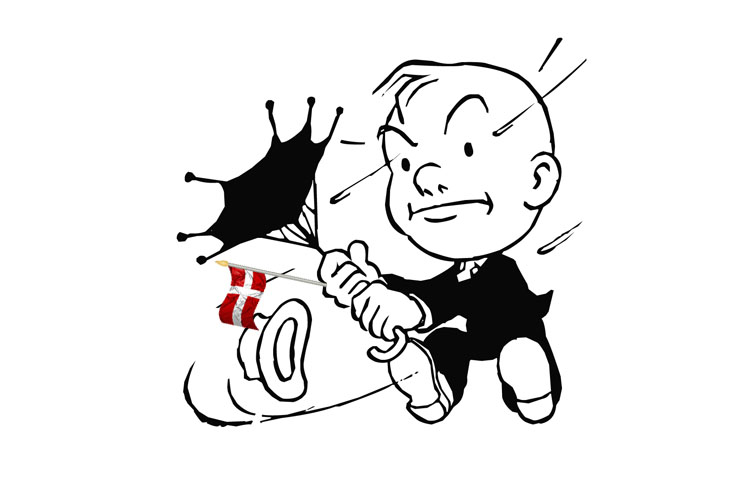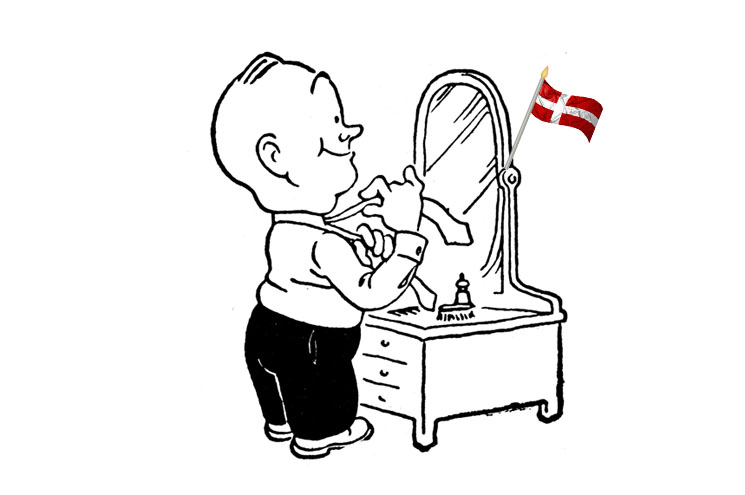Danish humor is a tricky thing for many foreigners. Danes compete with the Brits for world leaders in dry humor and sarcasm, but it can be hard for foreigners to figure out what’s a joke and what’s not.
In Denmark, if you drop the ball at work, drop your lunch entrée down the front of your business shirt, or make a fool of yourself for any other reason, you’re supposed to be able to laugh at your own bumbling.
In fact, the Danes have a tradition called the kvajebajer (failure beer) or kvajekage (failure cake.)
The person who makes a big mistake offers this beer or cake to others as a way of playfully admitting that he or she failed to live up to expectations.
One of my LinkedIn contacts, for example, worked for a company that failed to meet an important delivery date by two days. When it finally delivered the product, it also delivered a brightly-colored “failure cake”, which everyone took a few moments of the workday to enjoy.
Not all Danish humor is funny
Making fun of yourself can be fun and light-hearted, but Danish humor is not always so gentle.

Unik, the spokesman for a chain of cosmetics shops, says “I don’t shop here.” Classic Danish humor.
When directed at others, Danish humor is a perennial source of confusion for foreigners, and it can be a source of misunderstanding and discomfort in the office.
The basis of Danish humor is keeping people’s egos in line by cutting down anyone who thinks himself better than others. At its best, it’s self-deprecating, good-natured and playful, but it can also be dry, dark, and weird, and occasionally passive-aggressive and cruel. It is rarely laugh-out-loud funny.
For example, I was in a meeting held at one of the renovated 18th-century buildings beloved by the Danish creative class. We were upstairs in a room that had been converted from an attic. Thick wooden beams held up the slanting walls.
One of the meeting participants reached down to plug in her computer and, sitting up too quickly, bashed her head against the thick beam. There was a loud “thunk” as her skull hit the heavy wood, and an uncomfortable moment as she clutched her aching head.
Then someone in the room broke the silence. “No damage done,” he said cheerfully. “Not much in there anyway.”
She was Danish – she thought it was funny. Someone else might not have.
Sarcasm is seen as a sign of intelligence
For Danes, biting sarcasm is seen as proof of intelligence, confidence and wit. Foreigners already dealing with cultural confusion don’t always see it that way, particularly if the sarcasm is coming from their supervisor.
Most Danes are smart enough to avoid the worst aspects of Danish humor with newcomers, but sometimes a little barbed comment slips out anyway.
For example, if you arrive at a meeting a few minutes late, the meeting leader might say drily, “I hear you can buy watch batteries at the supermarket these days.” That’s a joke – and a reminder that tardiness is not appreciated.
It’s often said that when a foreigner is included into a circle of Danish humor, it’s because Danes know they can take it, and that they have accepted you as part of the group.
Until then, remember that if a Dane seems to be making fun of you, they are trying to laugh with you, not at you.
Or they are trying to get you to fall in line. It’s hard to be sure.
If you’re not sure if what someone is saying is supposed to be a joke, ask them.
No “big arm movements”
While passive-aggression is common in Denmark, open warfare is not.
Don’t raise your voice. Don’t yell. Don’t wave your arms around to make a point. (The Danes have a saying for people they see as too expressive – “he has big arm movements.”) And never, ever lose your temper.
In many cultures, losing your temper is seen as a sign of power and passion. Make a scene is a way of showing that you really care about something. If that something is an important personal relationship or an honorable political position, losing your temper is seen as noble and justified.
This is not true in Danish culture, where losing your temper is seen as a sign that you are childish, unable to control yourself, and basically untrustworthy.
Danes immediately lose respect for someone who “melts down.” If you think you’re going to blow your top at work, excuse yourself and go take a walk. (I’ve done it myself a few times.)
Someone who has been on the receiving end of your anger won’t forget quickly, and won’t be afraid to tell his friends or business contacts about your “crazy” behavior.
You never want to have an enemy in a small country like Denmark, where you will meet the same people again and again.
.
Buy Kay’s books about Denmark on Amazon, Saxo, Google Books, Apple Books, Barnes & Noble Nook, or via our webshop.
Image mashup copyright Kay Xander Mellish 2025
Read also:
April Fool’s in Denmark and the rough game of Danish humor
The Kvajebajer, or “Failure Beer”, and what it means for Danish working culture





